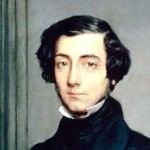Alexis-Charles-Henri Clérel de Tocqueville was born in Paris, France in 1805. He died in Cannes, France in 1859. He was one of the foremost political thinkers and historians of his time. His best known work was the two volume series “Democracy In America”, Volumes I and II written in 1835 and 1840 respectively. He authored this work during his extensive travels of America, and his interaction with the American people and their unique (at that time) still relatively new way of life. On page 319 , Volume II of “Democracy In America”, (hat tip to Mark Levin's "Ameritopia") he notes how insatiable and growing government as he had always known it to be throughout history ingratiates itself into the citizen’s daily life until one day we wake to find our freedom gone. Not stolen mind you, but surrendered willingly while believing that we have done well for the betterment of “all”, ourselves included.

In 1840 he observed: “After having thus successively taken each member of the community in its powerful grasp and fashioned him at will, the supreme power then extends its arm over the whole community. It covers the surface of society with a network of small complicated rules, minute and uniform, through which the most original minds and the most energetic characters cannot penetrate, to rise above the crowd. The will of man is not shattered, but softened, bent, and guided; men are seldom forced by it to act, but they are constantly restrained from acting. Such a power does not destroy, but prevents existence; it does not tyrannize, but it compresses, enervates, extinguished, and stupefies a people, till each nation is reduced to nothing better than a flock of timid and industrious animals, of which the government is the shepherd."
He went on further to say: "Our contemporaries are constantly excited by two conflicting passions: they want to be led, and they wish to remain free. As they cannot destroy either the one or the other of these contrary propensities, they strive to satisfy them both at once. They devise a sole, tutelary, and all-powerful form of government, but elected by the people. They combine the principle of centralization and that of popular sovereignty; this gives them a respite; they console themselves for being in tutelage by the reflection that they have chosen their own guardians. Every man allows himself to be put in leading-strings, because he sees that it is not a person or a class of persons, but the people at large who hold the end of his chain. By this system the people shake off their state of dependence just long enough to select their master and then relapse into it again. A great many persons at present day are quite contented with this sort of compromise between administrative despotism and the sovereignty of the people; and they think they have done enough for the protection of individual freedom when they have surrendered it to the power of the nation at large.”
*****************************************************


Stu H. April 9, 2012
Great Article!
jane s April 24, 2012
Thanks for writing this. I hated history in HS, but over the last 10 years or so I have taken a great interest in it–love reading this stuff!